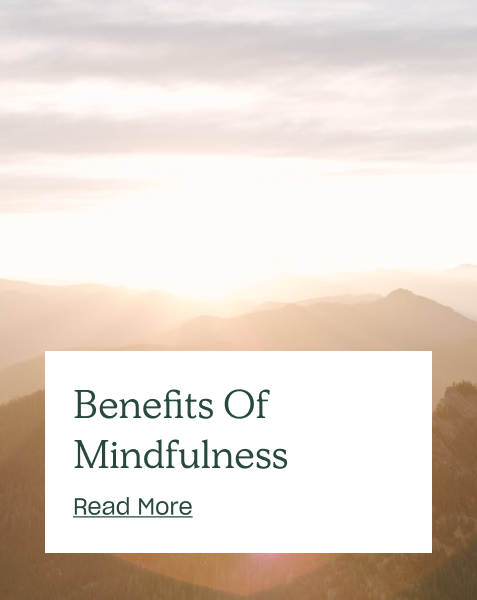Mindfulness is a hot topic at the moment, but why does mindfulness matter? Why is it important and what can it do for us?
How can mindfulness improve our health?
Every day we have between 60,000-80,000 thoughts, many of which can be negative or stress-enhancing. Getting a better handle on our thoughts can have a profound impact on our lives.
Stress has a huge impact on both our mental and physical health, activating our sympathetic nervous system, increasing cortisol levels in our body, and disrupting our gut health.
There are many simple techniques to mitigate this. From tuning in to your breath and your five senses, to guided meditations, flow state activities, and journaling. Feeling our best, both mentally and physically, is something that we need to work on every day. Feeling better is an accumulation of all the small things we do time and time again, and over time, that creates transformation and hopefully a true sense of well-being. Looking after our stress levels and our mental health is just as important as eating over 30 plant-based foods per week, sleeping, and moving our bodies. Ultimately, all these pillars connect; the happier we feel, the more likely we are to want to look after ourselves. The more sleep we’ve had; the more motivation we’ll find to do what we need to, and so on.
What is mindfulness?
Mindfulness can feel like a bit of a buzzword, it’s something we hear a lot and not something many of us relate to. When you break it down, it’s quite simple; it’s purely about being more present, being aware of how we feel, and engaging in what’s happening in the world around us. In this sense we can all be more mindful across the day. Mindful in the way we eat, in the way we work, in the way we interact with those around us, and in how we spend our days. It’s not about simply committing to long meditation practices - something that can feel semi-impossible to many of us.
7 ways to be more mindful
1. Simple Breathing Exercises
Our breath is such a powerful tool when it comes to our well-being. A simple practice of conscious breathing with long, slow inhales and exhales, can calm the body down, ground you, and create a sense of calm. Inhale through your nose for four beats, pause for four at the top, and slowly exhale out for four beats. If that feels comfortable then increase the count to six beats.
2. Tune in to Your Senses
Many physiotherapists use this as a tool for grounding, for anchoring us in the present when we get overwhelmed. Simply focus on what you can see, hear, feel, smell, and taste.
3. Connect Mind and Body
If meditation or breathing exercises aren’t for you, then try exploring other mindful practices that create a flow state. Activities like yoga, swimming, running, cooking, baking, knitting, crafting - anything that creates that constant flow state can make a huge difference and create a little calming, mindful time in your day. Cooking, yoga and long walks are the three that I turn to the most.
4. Meditation
This is one of the most popular tools of mindfulness. There are so many different ways to meditate, but guided meditations are my favourite. A ten or fifteen-minute guided meditation makes a world of difference to my mental health. We’ve been inspired by our friend, Gelong Thubten, a Buddhist monk who has taught us so much and has some fantastic meditations on the app.
5. Positive Affirmations
There is a huge amount of research on our ability to change our thoughts by mindfully focusing on reframing situations time and time again, as we create new neural pathways. That way of thinking can slowly become second nature. By focusing on positive affirmations every morning and reminding ourselves of these throughout the day, we can slowly find a more positive way of being. Hopefully overcoming any urge to self-sabotage or get lost in a sea of negative thoughts. I now try to make time to focus on three things I’m grateful for every morning; sometimes it’s as simple as a warm bed, a cup of coffee, and a hug – but either way, it grounds me and reminds me how lucky I am to have the day ahead of me. This, alongside my yoga practise has transformed me as a person. I’ve never been happier or calmer in my life and I’m so grateful for it.
6. Journaling and Gratitude Lists
Mindfully writing helps us remain present while letting go of any thoughts that are bothering us and reminding us of the good in each day, helping the brain regulate our emotions.
7. Be More Mindful of Technology
There are so many benefits to technology, we just need to ensure we use it in a way that benefits us. Using boundaries like setting time limits or leaving your phone in another room in the evening can help.
















